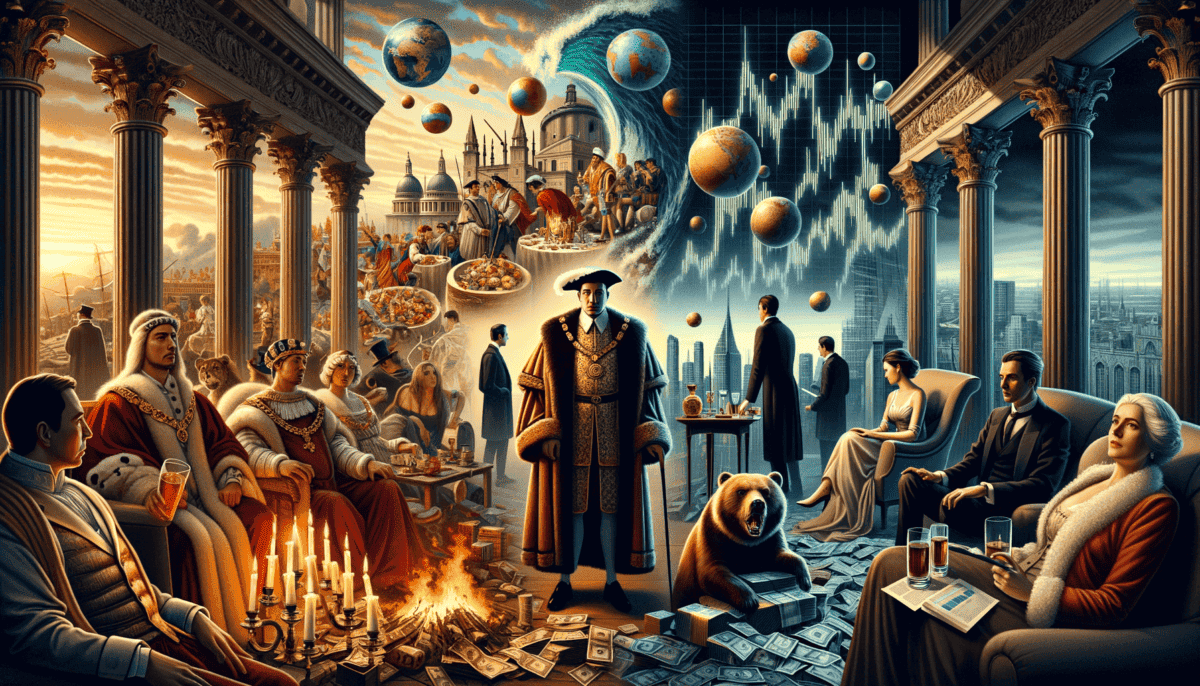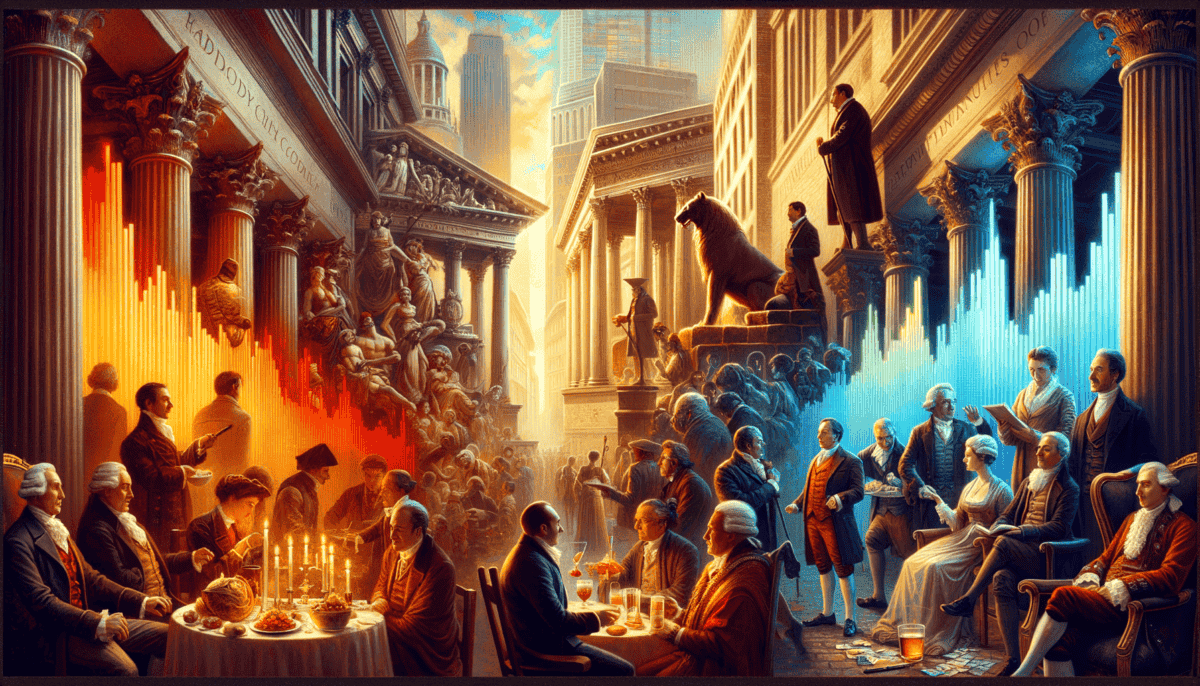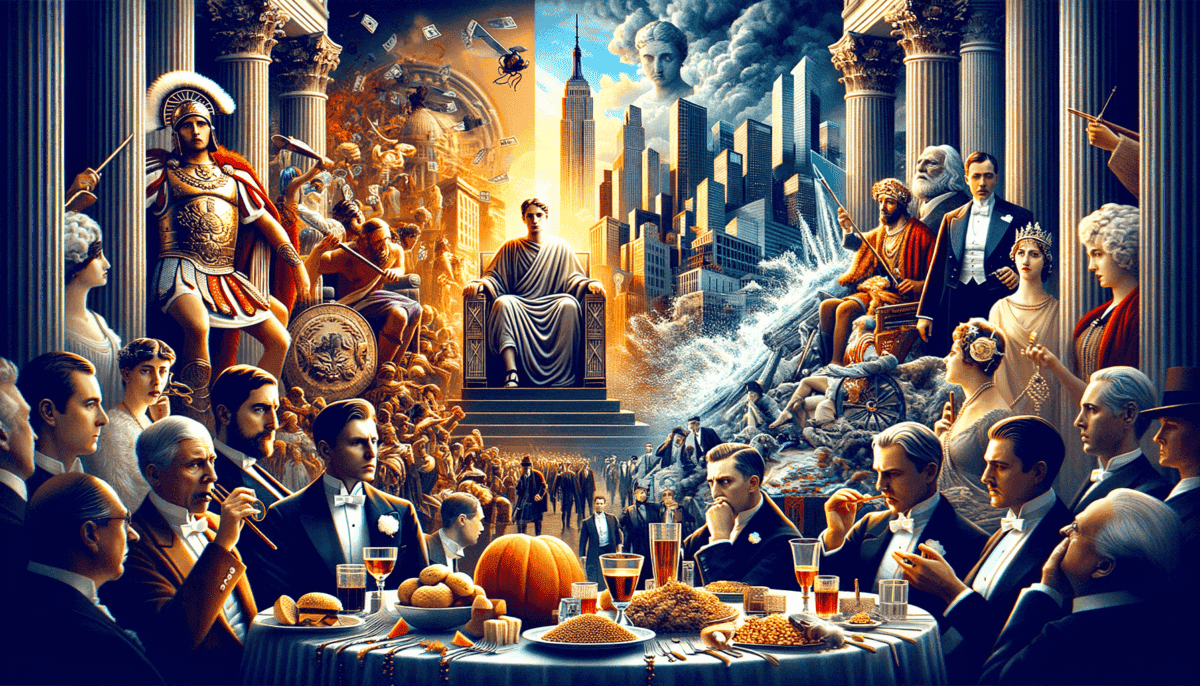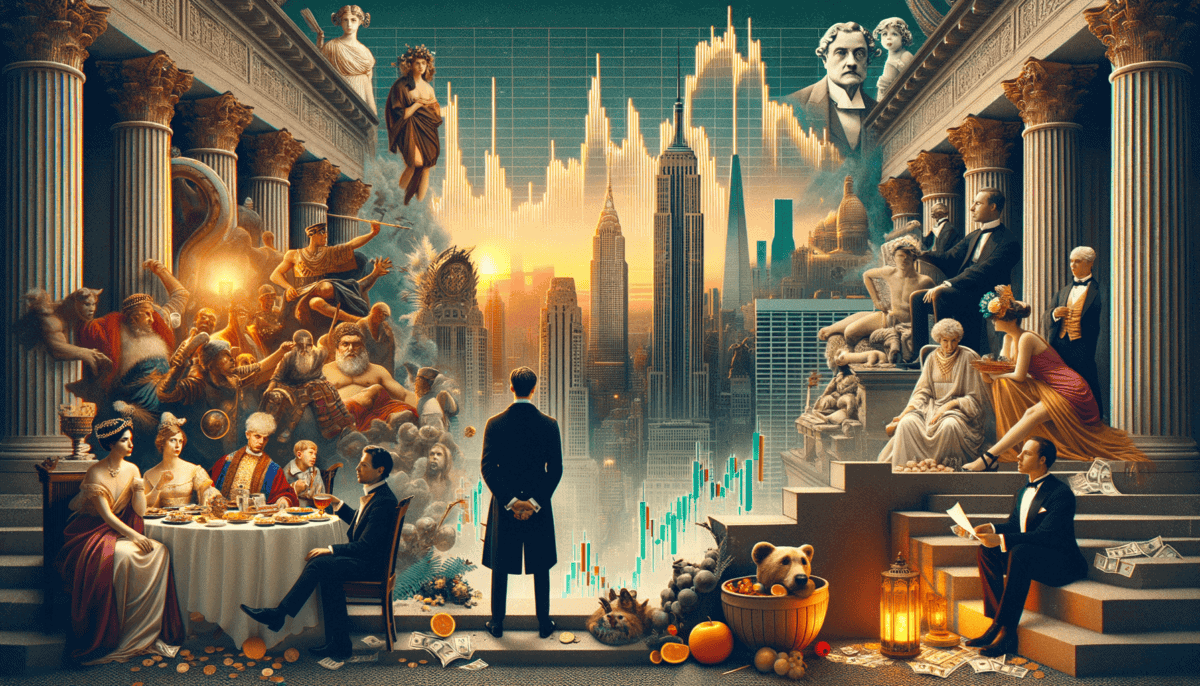The Roman Gamble
The golden halls of Nero's palace sparkled in the morning sun. But all that gold came with a big price tag.
"More gold! More jewels!" young Emperor Nero shouted, clapping his hands. He was just 16 years old when he became the ruler of Rome. Like a kid in a candy store with unlimited money, he wanted everything he saw.
Nero's friend Marcus watched with worry. "But sir, the treasury is getting empty," he said softly.
"Nonsense!" Nero laughed. "I'm the emperor. I can never run out of money!"
But Marcus was right. Every day, Nero spent more and more:
• A golden statue of himself taller than a building
• Parties that lasted for days
• A palace with rooms that sprayed perfume from the ceiling
• Indoor waterfalls made of wine
• Servants with golden shoes
The Big Problem Grows
The people of Rome started to notice something was wrong. Food prices went up. Soldiers didn't get paid on time. But Nero kept spending.
"Look at my new palace!" Nero said proudly. The walls were covered in gold and precious stones. "Isn't it beautiful?"
An old woman in the crowd whispered, "Beautiful for him, while we can't afford bread."
Things Get Worse
To pay for all his spending, Nero did some bad things:
- He took money from temples
- He made up new taxes
- He even made the money worth less by mixing cheap metal into gold coins
One day, a fire started in Rome. Instead of helping people, Nero watched from a hill and played his fiddle. Later, he used the burned land to build an even bigger palace!
Marcus tried one last time to warn him: "The people are angry, sir. We can't keep spending like this."
But Nero wouldn't listen. He just ordered another golden statue.
The Price of Too Much
Soon, the whole empire was in trouble. Soldiers weren't happy. People couldn't afford food. Everyone blamed Nero for spending all their money.
"We can't take it anymore!" the people shouted. They were so mad that Nero had to run away and hide.
Years later, people still talked about Nero's crazy spending. His golden palace became a symbol of what happens when someone spends too much money without thinking about tomorrow.
Marcus, who survived it all, would tell his grandchildren: "Remember the golden palace. Sometimes the most expensive things cost more than just money – they can cost you everything."
The sun set on Nero's empty palace, its gold dulled by time. But the lesson shined bright: no matter how rich you are, spending more than you have will always lead to trouble.
Royal Riches to Rags
King Henry VIII woke up in his big bed made of gold thread. He loved nice things. Maybe too much!
“Your Majesty,” said Thomas Cromwell, his money helper. “We need to talk about your spending.”
Henry wasn’t happy. “I’m the king! Kings need nice things!”
But Henry spent money on more than just clothes:
• Big castles that touched the sky
• Ships made of pure gold
• Parties with food for 600 people
• Wars that cost lots and lots of money
• Presents for all his friends
The Empty Money Bags
One day, Thomas brought bad news. “My king, our money is almost gone!”
“How can that be?” Henry asked. He looked at his ring with diamonds as big as grapes.
“Well,” Thomas said, counting on his fingers. “The war with France cost more than all the gold in London. Your new castle costs more than 1,000 houses!”
Bad Choices
Henry needed money fast. He did things that made people very sad:
He took gold from churches. He made people pay more taxes. Some poor farmers couldn’t buy food because they had to give their money to the king.
“But I need my new castle!” Henry said. “And my new boats! And my parties!”
Thomas shook his head. “Sometimes we have to say no to things we want.”
The Big Problem
Soon, everything got worse. The money problems made Henry angry all the time.
“Your children will have to pay for all this,” Thomas warned.
He was right. Henry’s son Edward became king when he was just a boy. Poor Edward had to sell many of his father’s nice things to pay the bills.
The Lesson Lives On
Years later, people still talked about King Henry’s money troubles. His story taught a big lesson: just because you can buy something doesn’t mean you should.
Old Thomas would tell visitors to the empty palace: “See these golden walls? They look pretty, but they cost more than just money. They cost a whole kingdom its peace.”
The sun set on Henry’s quiet castles. Their windows didn’t shine like they used to. But the story of the king who spent too much lived on, teaching people to be careful with their money.
Money Madness at Sea
The year was 1720. London was buzzing with excitement! Everyone talked about getting rich fast from something called the South Sea Company.
“It’s magic!” people said. “Put your money in, and it grows like a garden!” But was it really that easy?
The Big Promise
The South Sea Company had a simple story. They said they would sail big ships to South America and trade gold for fun things to sell.
“My dear,” said Lady Margaret to her husband. “Everyone is buying shares! We must join in!”
Even the king put his money in! The price of shares went up and up:
• January: £100
• May: £500
• June: £900
• August: £1,000!
Newton’s Big Mistake
Sir Isaac Newton was very smart. He knew all about stars and gravity. But even he got caught up in the excitement!
“I can calculate the movement of stars,” Newton said later, “but not the madness of people.”
The Bubble Pops
Then one day, everything changed. People started asking questions. “Where are the ships? Where is the gold?”
“There aren’t any!” someone shouted in the coffee house. “It’s all made up!”
The price of shares dropped faster than a rock:
September 1st: £700
September 15th: £400
October 1st: £200
December: £100
Sad Stories
Many people lost everything. Thomas lost his house. Sarah had to sell her pretty dresses. John couldn’t buy food for his family.
“How could we be so silly?” people asked. “We should have been more careful with our money!”
Learning From Mistakes
The South Sea Bubble taught everyone a big lesson. Don’t believe in magic money. Don’t follow the crowd just because everyone else is doing something.
Little Billy asked his grandmother years later, “Why do you keep your money in a safe place?”
“Because,” she smiled, “I remember the South Sea Bubble. Sometimes the biggest dreams can turn into the biggest nightmares.”
The streets of London grew quiet again. But people never forgot the year when everyone thought they could get rich quick. The lesson stayed alive: be careful with your money, and don’t believe in money magic! ✨
The Railroad King’s Gamble
In 1868, Cornelius Vanderbilt stood at his office window in New York City. He was one of the richest men in America. But even he wasn’t safe from money troubles!
The Train Race
“More trains!” Vanderbilt shouted. “We need more trains!” He loved trains and owned many railroads. But other rich men wanted his trains too.
Jay Gould and Jim Fisk were tricky businessmen. They played a mean game with Vanderbilt’s money.
“Let’s buy lots of train company shares,” they whispered. “Then we’ll make the price go way up!”
The Big Trick
Vanderbilt thought he was smart. He kept buying more and more shares of the Erie Railroad. But something wasn’t right!
“Something’s wrong,” said Vanderbilt’s friend. “The shares are like magic – they never run out!”
Money Going Away
Vanderbilt’s money started disappearing fast:
• Monday: Lost $1 million
• Tuesday: Lost $2 million
• Wednesday: Lost even more!
“Stop!” yelled Vanderbilt. “This is a trick!” But it was too late. He had lost $7 million!
Fighting Back
Vanderbilt was angry. He went to the judges and said, “They cheated me!”
“I won’t let them beat me,” Vanderbilt said. He worked hard to save his money and his trains.
Getting Stronger
Instead of giving up, Vanderbilt got smarter. He built new train lines. He made better plans.
“My grandfather always says to check twice before spending money,” said little Mary to her friend.
“Why?” asked her friend.
“Because even the Railroad King almost lost everything!”
The Happy Ending
Vanderbilt didn’t stay down for long. He built more railroads and made even more money than before!
“What did you learn?” his son asked him.
“Never trust someone who wants your money too much,” Vanderbilt said with a smile. “And always keep some savings for hard times.”
The Railroad King had learned a big lesson. Sometimes the biggest money problems can make us stronger and smarter! ✨
Wall Street’s Darkest Days
The streets of New York City buzzed with excitement in 1929. Everyone was getting rich! People bought fancy cars and big houses. They thought the good times would last forever.
Happy Days Turn Sad
Meet Sarah Thompson, a rich lady who lived in a big mansion. She had lots of money in stocks. “The market only goes up!” she told everyone.
But her friend Tommy, a bank worker, wasn’t so sure. “Be careful,” he warned. “Things that go up can come down.”
The Big Crash
One day in October, something scary happened. The stock market started falling!
“Sell! Sell! Sell!” people shouted on Wall Street. Everyone was trying to save their money.
Rich People Become Poor
Sarah watched her money disappear:
• Her stocks became worthless
• She had to sell her fancy car
• Her big house was gone too
“I lost everything,” Sarah cried. Many rich people became poor overnight.
Hard Times for Everyone
The whole country felt sad. Banks closed. Stores shut down. Many people lost their jobs.
“Remember when we had ice cream every day?” a little boy asked his mom.
“Now we’re lucky to have bread,” she answered softly.
Learning to Save
People learned important lessons about money during this time:
“Don’t spend all your money at once,” parents told their kids.
“Save some for tomorrow,” teachers said in schools.
Getting Better Together
Slowly, things got better. People helped each other. They shared food and clothes.
“We don’t have much,” Sarah said to her neighbors, “but we have each other.”
Tommy the bank worker smiled. “Sometimes losing money teaches us what’s really important.”
A New Start
The hard times taught everyone to be careful with money. Rich people learned not to be too greedy. Poor people learned to save what they could.
Sarah found a new job and started over. She was happier with less money but more wisdom.
The crash of 1929 changed how people think about money forever. Being rich isn’t just about having lots of money – it’s about being smart with what you have!
Learning from Money Mistakes
Today, people still lose lots of money. Let’s meet some modern folks who had big money troubles and see what they learned!
The Movie Star’s Story
Jack Golden was a big movie star. He had three fancy houses and ten cars!
“I can buy anything I want!” Jack would say. He spent money like it would never end.
But then something bad happened. Jack stopped getting movie jobs. He couldn’t pay his bills.
The Sports Hero’s Fall
Maria Run-Fast was a famous runner. She won lots of races and made millions! ♀️
“My friend said he would make my money grow,” Maria told reporters. “Instead, he took it all!”
Smart Money Rules We Learned
These stories taught us important things about money:
• Save some money for later
• Don’t trust everyone with your money
• Live within your means
• Plan for when things go wrong
New Ways to Be Smart
People now use phones and computers to watch their money.
“I wish I knew these things before,” Jack said. “Now I teach kids about money.”
Hope for Tomorrow
Both Jack and Maria started over. They learned to be careful with money.
“I’m happier now,” Maria says. “I have less stuff but more peace.”
What We All Can Do
Everyone can be smart with money! Here’s how:
“Save some money every time you get it,” Jack tells kids now.
“Ask grown-ups for help,” Maria says. “Don’t be afraid to learn about money.”
The Big Lesson
From Roman emperors to movie stars, people keep making the same money mistakes. But we can learn from them!
Now you know about money mistakes through history. You can be smarter than emperors and movie stars! Keep learning, keep saving, and be wise with your money.
Jack and Maria smile when they see kids saving money. “The future is bright,” they say, “when we learn from the past!” ✨






